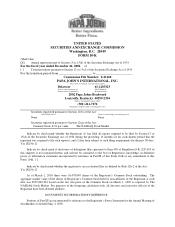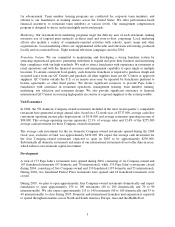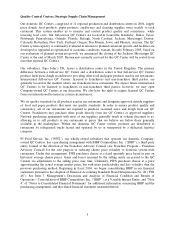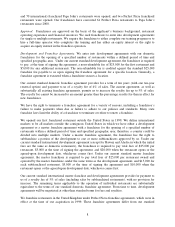Papa Johns 2004 Annual Report Download - page 6
Download and view the complete annual report
Please find page 6 of the 2004 Papa Johns annual report below. You can navigate through the pages in the report by either clicking on the pages listed below, or by using the keyword search tool below to find specific information within the annual report. 5
Quality Control Centers; Strategic Supply Chain Management
Our domestic QC Centers, comprised of 11 regional production and distribution centers in 2004, supply
pizza dough, food products, paper products, smallwares and cleaning supplies twice weekly to each
restaurant. This system enables us to monitor and control product quality and consistency, while
lowering food costs. Our full-service QC Centers are located in Louisville, Kentucky; Dallas, Texas;
Pittsburgh, Pennsylvania; Orlando, Florida; Raleigh, North Carolina; Jackson, Mississippi; Denver,
Colorado; Rotterdam, New York; Portland, Oregon; Des Moines, Iowa; and Phoenix, Arizona. The QC
Center system capacity is continually evaluated in relation to planned restaurant growth, and facilities are
developed or upgraded as operational or economic conditions warrant. In early February 2005, based on
our evaluation of planned restaurant growth, we announced the closing of the Jackson, Mississippi QC
Center at the end of March 2005. Restaurants currently serviced by this QC Center will be routed from
our other regional QC Centers.
Our subsidiary, Papa John’s UK, leases a distribution center in the United Kingdom. The primary
difference between a full-service QC Center and a distribution center is that full-service QC Centers
produce fresh pizza dough in addition to providing other food and paper products used in our restaurants.
International full-service QC Centers, licensed to franchisees and non-franchisee third parties, are
generally located in the markets where our franchisees have restaurants. We expect future international
QC Centers to be licensed to franchisees or non-franchisee third parties; however, we may open
Company-owned QC Centers at our discretion. We also have the right to acquire licensed QC Centers
from our international licensees in certain circumstances.
We set quality standards for all products used in our restaurants and designate approved outside suppliers
of food and paper products that meet our quality standards. In order to ensure product quality and
consistency, all of our restaurants are required to purchase seasoned sauce and dough from our QC
Centers. Franchisees may purchase other goods directly from our QC Centers or approved suppliers.
National purchasing agreements with most of our suppliers generally result in volume discounts to us,
allowing us to sell products to our restaurants at prices that we believe are below those generally
available in the marketplace. Within our domestic QC Center system, products are distributed to
restaurants by refrigerated trucks leased and operated by us or transported by a dedicated logistics
company.
PJ Food Service, Inc. (“PJFS”), our wholly-owned subsidiary that operates our domestic Company-
owned QC Centers, has a purchasing arrangement with BIBP Commodities, Inc. (“BIBP”), a third-party
entity formed at the direction of the Franchise Advisory Council (see Franchise Program – Franchise
Advisory Council) for the sole purpose of reducing cheese price volatility to domestic system-wide
restaurants. Under this arrangement, PJFS purchases cheese at a fixed quarterly price based in part on
historical average cheese prices. Gains and losses incurred by the selling entity are passed to the QC
Centers via adjustments to the selling price over time. Ultimately, PJFS purchases cheese at a price
approximating the actual average market price, but with more predictability and less volatility than the
previous purchasing method. Beginning in fiscal 2004, we began consolidating BIBP in our financial
statements pursuant to the adoption of Financial Accounting Standards Board Interpretation No. 46 (“FIN
46”). See Item 7. Management’s Discussion and Analysis of Financial Condition and Results of
Operations – Consolidation of BIBP Commodities, Inc. (“BIBP”) as a Variable Interest Entity, and “Note
4” of “Notes to Consolidated Financial Statements” for additional information concerning BIBP and the
purchasing arrangement, and the related financial statement treatment thereof.



















